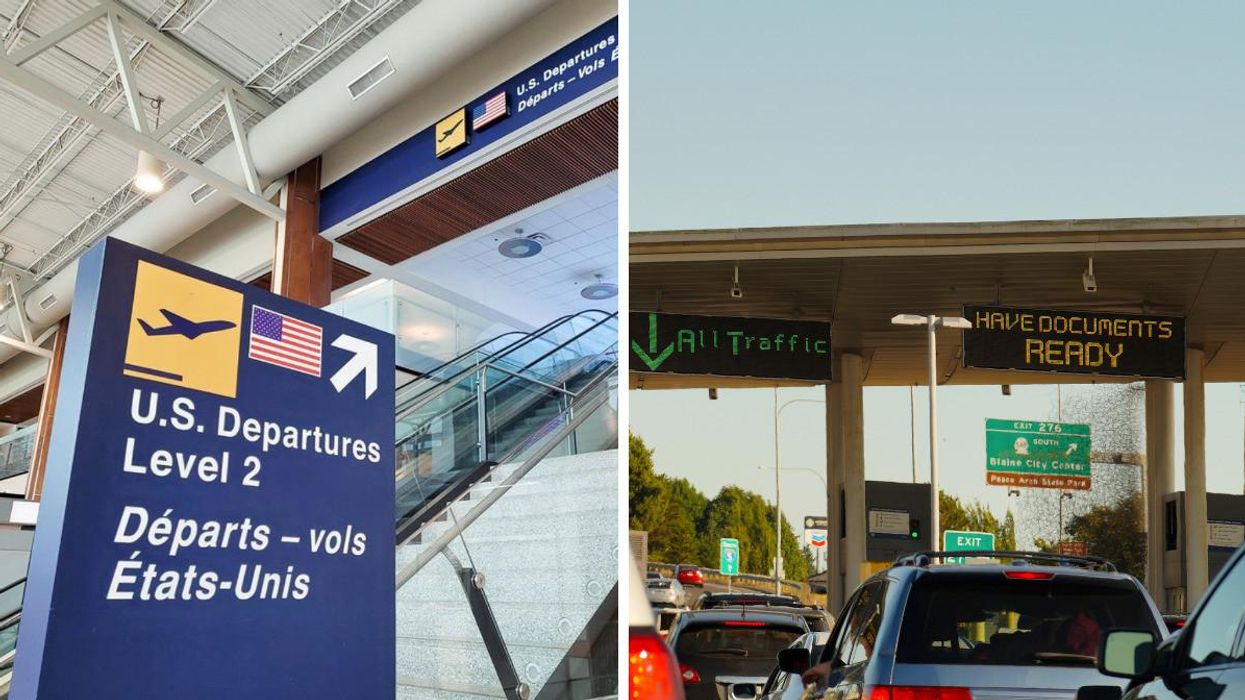Canada-US Border Rules — Here's Everything You Should Know If You're Travelling Soon
Even fully vaccinated travellers continue to face restrictions. 🇨🇦

A U.S. departures sign at a Canadian airport. Right: Cars line up at the Canada-U.S. land border.
Are you crossing the Canada-U.S. border soon? With the Labour Day long weekend just around the corner, Canadians and Americans may be planning to cross the border for shopping, tourism or visiting friends and family.
But, before you get going, it's worth getting clued up on the most recent travel restrictions at the Canada-U.S. border, to avoid getting into any trouble.
Over the past two years, travel measures in Canada and the United States have changed a lot, and the restrictions recently changed again on the Canadian side for air passengers.
Thanks to a rule update on July 19, travellers entering or returning to Canada via air may now be randomly selected for mandatory COVID-19 testing.
At four major airports — Vancouver, Calgary, Montreal and Toronto — fully vaccinated people may be selected by border officials to leave the airport to be tested for COVID-19.
Unlike before, testing will take place at an in-person appointment at a testing provider location (such as a pharmacy) or via a virtual appointment. Tests will no longer be taken at the airport, in an effort to improve backlogs caused by public health restrictions.
"Air travellers who qualify as fully vaccinated and who are selected for mandatory random testing, as well as air travellers who do not qualify as fully vaccinated, will receive an email notification within 15 minutes of completing their customs declaration," says a notice from the federal government.
Fully vaccinated individuals, regardless of whether they're arriving in Canada as tourists or returning home to Canada as residents, are required to comply if selected.
There are some "limited exemptions."
Those who fail to comply "may not be exempted from quarantine," says the Government of Canada website.
"You may also be required to go to a quarantine facility, face fines, or other enforcement measures."
Individuals who are chosen for testing are permitted to continue on to their final destination, whether that be in Canada or on a connecting flight to somewhere else.
Although passengers are not required to wait for their test results, travellers who do test positive must go into isolation for 10 days from the date of the result.
Anybody entering the country must continue to use the ArriveCAN app or website to share their travel details within 72 hours before arrival in Canada.
The United States no longer requires air passengers from abroad to show a negative COVID-19 test before they board their flight. Proof of vaccination is still required, though. Only limited exceptions apply.
What about land borders?
Mandatory random testing continues at Canada's land border points of entry, with no changes. If selected, passengers entering Canada via land are given a self-swab kit to complete.
Travellers must use ArriveCAN to submit their travel and quarantine plans.
However, the feds recently confirmed that fully vaccinated Canadian travellers can qualify for a one-time exemption from fines and quarantine if they fail to follow all entry requirements when returning home.
As of July 29, this also covers fully vaccinated foreign nationals entering Canada via a land border, including individuals from the United States.
On the other side of the border, international travellers are permitted to enter the United States via land if they are considered fully vaccinated by the CDC and have appropriate documentation.
Non-U.S. individuals must verbally attest to their COVID-19 vaccination status, provide proof of their vaccine status where necessary and be prepared to present valid travel documents.
COVID-19 testing is not required for entry into the U.S. via either land or ferry port of entry.
Unvaccinated travellers
Air passengers with a right to enter Canada who aren't considered to be fully vaccinated — anybody who hasn't been vaccinated with a primary series of a COVID-19 vaccine accepted by the Government of Canada — must take a COVID-19 test on arrival, on Day One and on Day Eight of their 14-day quarantine.
Like passengers who have received a COVID-19 vaccine, on-arrival testing for unvaccinated people will take place outside of airports.
While mandatory random testing was temporarily lifted in airports for fully vaccinated travellers, requirements were not altered for those who are not considered fully vaxxed.
Unvaccinated people from other countries are not permitted to enter Canada, unless exempt.
Unvaccinated people who are a non-U.S. citizen, non-U.S. immigrant and not fully vaccinated will not be allowed to board a flight to the United States unless otherwise exempt. The same applies to land travellers in these cases, with limited exceptions.
Canada's travel restrictions are currently set to end on September 30, although it's not yet clear if they will be extended further.
Before you get going, check out our Responsible Travel Guide so you can be informed, be safe, be smart, and most of all, be respectful on your adventure.
This article's cover image was used for illustrative purposes only.
- 6 Cross-Border Shopping Tips You Should Know If You're Heading ... ›
- Canada's Travel Rules Are Getting Stricter Again & Even Fully ... ›
- Canada's Travel Restrictions Have Been Extended & Here's What It ... ›
- 6 Ways Living In Canada Has Changed The Way I Travel, As Someone Who Grew Up In Europe - Narcity ›